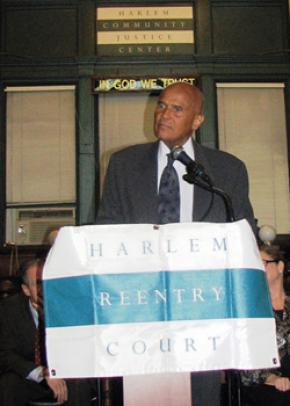
The 10th graduation of the Harlem Reentry Court featured a special guest.
“I was born in Harlem, and I grew up in Harlem and now at 82, I’m still in Harlem,” said Harry Belafonte, the singer, actor and activist, as he congratulated the Reentry Court’s 17 graduates on satisfying the program’s rigorous requirements.
The Harlem Parole Reentry Court helps parolees returning from incarceration make the transition from life in prison to responsible citizenship. The court—a project of Harlem Community Justice Center, the New York State Division of Criminal Justice Services and the Division of Parole—links parolees to a wide range of social services, including drug treatment, transitional employment and vocational services, health care and mental health treatment.
To promote increased accountability, participants are required to return to the Justice Center frequently to meet with case managers and parole officers and appear before an administrative law judge, who closely monitors their compliance with court orders.
At the ceremony on Sept. 1, 2009, Belafonte was cheered by the graduates, their family members, and court staff. “You bring a gift and it is my responsibility … to wrap my arms around your gift and to help see if there’s something we can do to make this program,… this courtroom, and all the people sitting here feel that they’re being rewarded for the investment they’re making in the people coming out of the incarceration system,” Belafonte said.
In addition to being a top-selling singer, the first African-American man to receive an Emmy and the recipient of a Grammy Lifetime Achievement Award, Belafonte has long been an outspoken advocate for many causes, including the civil rights movement, UNICEF, and sentencing reform.
“I got very much engaged in the criminal justice system when I got involved with politics,” Belafonte said in an interview before the ceremony’s start. “I saw what was happening to us in the justice system so I thought I’d focus on that.”
Belafonte told those assembled in the courtroom of the Harlem Community Justice Center on 121st Street in Manhattan about some of the hardships he faced growing up.
“I was a high school drop out. I never finished high school. As a matter of act, when I left high school, I could hardly read or write. But compelling circumstances and the opportunity to meet people who were indigenous to my community who had done a lot with their lives reached out for me, gave me a chance to see alternatives,” Belafonte said.
Other speakers at the graduation included program director John Megaw and Judge Grace Bernstein. In addition, Parole Officers Yvonne Oliver and Carmen Levine spoke movingly about participants’ specific achievements, including jobs they’d found, apartments they’d located, and their studious observation of curfews and other rules.

